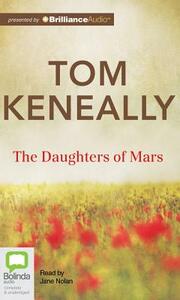Take a photo of a barcode or cover
Over a 100 pages in and it is stil so dry and a bit dull - characters are all the same
A long, hard book (just like the war), beautiful and sad. You will live a lifetime with these women, and a fascinating ending.
Although a hard book to get into at first, the more and more I read the more and more I became enthralled with the world of 'The Daughters of Mars'. By the end, I struggled to put it down.
I FINALLY finished this damn book. I should've put it down when it started to feel like a slog.
It took me a while to warm to this book, as the daughters of the title are a little cold and aloof. At one point I thought they might have, between them, every possible experience of WWI so that we could have it too, but less than half way through I found it captivating. I love WWI as a setting, and haven't often gone to Egypt and Turkey as well as France and England. The characters go on a moving journey, based on journals of real Aussie nurses, and I ended up really enjoying this book.
The Daughters of Mars, which was published in 2012, is a powerful novel about two sisters from rural NSW who are nurses during the Great War. It is one of those proper epics that traverses continents, hemispheres and world history, and tells the story, not only of sibling rivalries, family obligations and small-town jealousies, but of what it was like to go to the other side of the earth to nurse the men so horribly maimed and injured, first in the Dardanelles, then on the Western Front. Keneally brings to life so much of that brutal conflict, I found myself grimacing in places, wiping tears away at others. Yet this book is never soppy or sentimental.
To read my review in full, please visit my blog.
To read my review in full, please visit my blog.
This wartime sister-nurse melodrama just didn't work for me.
Sadly disappointed. I have a high opinion of Mr Kenneally's writing but on this occasion I really struggled. It seemed to me that he struggled to find the best the best medium to tell this story with the result that he chopped and changed strategies as he went along. The Durance sisters were known for being aloof and we can see why but it's not until the last 20% of the story that I got a real feel for who they were and felt an urgency to know what happened next. Much of the book focused on plot as if it didn't affect the protagonists with little resulting character development. If you know the story of WWI this makes the book a bit predictable although the depth and particularity of Mr Kenneally's knowledge is clearly extensive and to be respected. As an ex nurse I loved being reminded of the primitive nature of the the 'cutting edge' knowledge and technology they brought to bear and what a difference even that made. I appreciated the clearly delineated risks that nurses suffered from their own side due to the status of women and the terrible system that promoted incompetence. But how did Sally and Naomi FEEL about most of the hardships they experienced and witnessed? And how did these responses influence who they became? Mostly we don't know. And I question the value of the alternative endings. That seemed to me to be an intellectual conceit that added nothing to the whole book except another incompletely developed theme. In spite of all this I grieved the loss at the end. Which means he finally got me engaged!
I received an advanced copy of this book through a Goodreads giveaway. Thank you!
In "The Daughters of Mars," Sally and Naomi Durance leave their home to become nurses in the First World War. Their mother has just died from a painful bout of cancer, and neither sister can imagine sitting home in the Australian countryside waiting for life to happen to them. Both have plenty of nursing training, but that is nothing compared to what they see in Gallipoli and later on in France. They and their tightly-knit group of fellow nurses first work on a hospital ship in the Mediterranean and then very near the battlefields in France. As you can imagine, some friends and patients are lost, some come back, but all of them are changed in so many ways through their experiences.
I was very impressed with the strength of the women in this story. So many books about war only impress upon you the bravery of the men fighting (and the soldiers' bravery was also featured here with good reason), but it isn't often that you get to see the strength and gumption of the women that were fighting to keep these soldiers alive. Sally, Naomi, and the other nurses constantly put themselves in harm's way to try and help their patients and keep each other alive.
Sally and Naomi have a complicated relationship originally stemming from Sally's resentment at Naomi having left the homestead for a new life in the city. Though the reasons for tension between the two become a lot more complicated than that over time, I did enjoy the progression in their relationship and the mutual respect, love, and dependence they came to have for each other. It was interesting to see how their relationship evolved and how their lives were changed by their war experiences.
Though as much as I came to really admire the Durance girls, my favorite character by far was Matron Mitchie. She was such a tough old bird, and she never gave up. I really enjoyed the parts of the storyline that included her, and I was happy to see her story gain more layers as the book went along.
I very much enjoyed this story and the characters within. It took some very unexpected turns, but the journey was worth it.
In "The Daughters of Mars," Sally and Naomi Durance leave their home to become nurses in the First World War. Their mother has just died from a painful bout of cancer, and neither sister can imagine sitting home in the Australian countryside waiting for life to happen to them. Both have plenty of nursing training, but that is nothing compared to what they see in Gallipoli and later on in France. They and their tightly-knit group of fellow nurses first work on a hospital ship in the Mediterranean and then very near the battlefields in France. As you can imagine, some friends and patients are lost, some come back, but all of them are changed in so many ways through their experiences.
I was very impressed with the strength of the women in this story. So many books about war only impress upon you the bravery of the men fighting (and the soldiers' bravery was also featured here with good reason), but it isn't often that you get to see the strength and gumption of the women that were fighting to keep these soldiers alive. Sally, Naomi, and the other nurses constantly put themselves in harm's way to try and help their patients and keep each other alive.
Sally and Naomi have a complicated relationship originally stemming from Sally's resentment at Naomi having left the homestead for a new life in the city. Though the reasons for tension between the two become a lot more complicated than that over time, I did enjoy the progression in their relationship and the mutual respect, love, and dependence they came to have for each other. It was interesting to see how their relationship evolved and how their lives were changed by their war experiences.
Though as much as I came to really admire the Durance girls, my favorite character by far was Matron Mitchie. She was such a tough old bird, and she never gave up. I really enjoyed the parts of the storyline that included her, and I was happy to see her story gain more layers as the book went along.
I very much enjoyed this story and the characters within. It took some very unexpected turns, but the journey was worth it.
This book was following me around. I had no intention of reading it but it would catch my eye every time I went into a book shop or when I was looking at books online. Normally I would think I was the victim of a clever marketing department but this time I'm the winner after reading Daughters of Mars.
The story of Sally and Naomi Durance will now define my perspective when World War I is mentioned. I have always felt that commemorations of wars are a very 'blokey' affair with women's participation tacked on as an after thought. Daughters of Mars tells a story which highlights that, while there were less women involved in WWI, their sacrifice was just as significant and their male counterparts.
The story of Sally and Naomi Durance will now define my perspective when World War I is mentioned. I have always felt that commemorations of wars are a very 'blokey' affair with women's participation tacked on as an after thought. Daughters of Mars tells a story which highlights that, while there were less women involved in WWI, their sacrifice was just as significant and their male counterparts.




